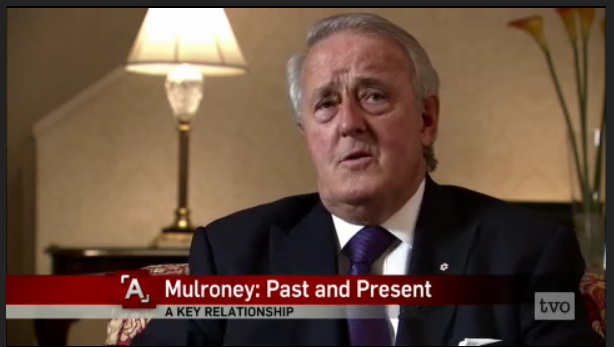What if it doesn’t work?
What if Prime Minister Stephen Harper’s tightly controlled, harshly disciplined approach to running the government of Canada somehow fails to deliver the majority he requires to create his dreamed-of neo-conservative dystopia?
Is it just us social democrats smoking banana peels again, or can you almost hear the creaking sounds of the centrifugal forces inherent in Harper’s uneasy right-wing coalition starting to tear the whole machine apart?
Because, people, Harper may be pretty far out there in right field of economic fundamentalism — but not every Canadian Conservative is there with him. Indeed, there’s no shortage of old Joe Clark-style Red Tories floating around — including more than a few in important posts in the government of Alberta — who are growing uncomfortably leery of the direction Harper proposes to take the country.
Moreover, not so far on the other side of the prime minister are the social conservatives — religious fundamentalists, Biblically literal gay haters and patriarchal fogeys who think women belong in the kitchen, perhaps not barefoot and pregnant, but at least quietly obedient and without much choice.
Like any modern American politician, Harper pays ritual obeisance to the meaningless pieties of the era — God bless Canada! — but the evidence suggests he personally holds stronger Christian evangelical and fundamentalist views that he has worked hard to keep out of sight of the secular public for fear of the impact they might have on his electoral chances.
But for the religious fundamentalists in the present Conservative coalition, insufficient piety is a sign of political unworthiness.
As it happens, both camps have been heard from in the past week.
My neighbour Link Byfield — the post-conservative Alberta icon, would-be Senate reformer and now provincial Wildrose Alliance candidate — whinged in the National Post last week about Harper’s insufficient attention to social conservative dogma.
“Harper has made it abundantly and compellingly clear that the social conservative agenda is not to be contemplated in his government and not to be advocated or advanced,” Byfield complained in the pages of the Post, apparently miffed because the prime minister promised to close down the long-gun registry but expressed no interest in renewing debate on abortion or same-sex marriage, at least for the moment.
“He will have come to this conclusion because he has seen it necessary to get centre voters,” said Byfield, former editor of the now-defunct Alberta Report magazine. Darn centrist voters, anyway!
While Byfield stopped short of issuing a fatwa against voting for the inadequately socially conservative Harperistas, it wasn’t hard to perceive what he was thinking when he added: “…As long as he’s leader that will remain the case.”
Meanwhile, the same day we heard from the socially more liberal side of the Conservative coalition in the surprising form of none other than Brian Mulroney, the most successful — and most reviled — Conservative prime minister of the modern era.
In an interview with TV Ontario’s Steve Paikin, moderator of tomorrow’s English-language television debate, Mulroney praised all three opposition leaders and damned Harper with faint praise.
“We’ve got Prime Minister Harper,” Mr. Mulroney said, “who’s” … pause … “clearly a competent prime minister.” Then he went on to heap much greater praise on Liberal Leader Michael Ignatieff (“who has the worst job in Canada, by the way … a tough, thankless job, and he’s an intelligent man, a hard-working guy…” Mulroney had similarly kind things about NDP Leader Jack Layton and even Bloc Quebecois Leader Gilles Duceppe.
OK, Mulroney has his issues with the Harper Government — they threw him under the bus, after all, for his iffy dealings with Karlheinz Schreiber, the German deal-maker now serving time for tax evasion in his homeland.
Still, it’s another country heard from, and that’s not a reference to central Europe. “You never can tell what happens in political life,” Mulroney observed, a little smile playing at times on his well-preserved and familiar features. “Tell you this, in 1984, when the campaign started, I was 14 points behind. We ended up in a rather different fashion!” The largest majority in Canadian history, that would be.
So, is Harper’s tightly coiled Conservative coalition likely to come apart? Don’t count on it. Not yet, anyway.
But you can sense pressure building. And if this current Conservative prime minister somehow fails to get his yearned-for majority — as that former Conservative prime minister suggested could happen — here’s a prediction that the whole contraption will disintegrate with an almighty bang!
This post also appears on David Climenhaga’s blog, Alberta Diary.



